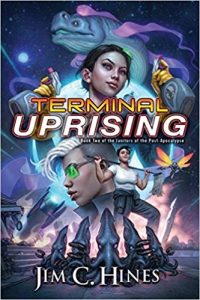Liz Bourke Reviews Terminal Uprising by Jim C. Hines
 Terminal Uprising, Jim C. Hines (DAW 978-0-7564-1277-7, $26.00, 336p, hc) February 2019. Cover by Daniel Dos Santos.
Terminal Uprising, Jim C. Hines (DAW 978-0-7564-1277-7, $26.00, 336p, hc) February 2019. Cover by Daniel Dos Santos.
Jim C. Hines’s work is well known for its verve, energy, and sense of humour. Its frequently scatological sense of humour, at that. Hines’s talents have remained over some 12 novels, and now extend into a thirteenth, Terminal Uprising, the second book in his Janitors of the Post-Apocalypse series, after 2018’s Terminal Alliance.
In the course of Terminal Alliance, Marion “Mops” Adamopoulos and her team of hygiene and sanitation specialists stole the EMCS Pufferfish, stopped a bioterrorism attack, and learned the truth about why the human race had been reduced to shambling, feral monsters. It turns out to be the fault of an alien race called the Krakau, who (allegedly accidentally) released a plague on the humans. A hundred years later, the Krakau returned to Earth and tried to fix the damage. Mops and her team were the rejects from the Krakau’s fierce human infantry – for the Krakau’s relatively small number of somewhat-rehabilitated humans are generally employed as soldiers in the apparently endless war against the xenocidal Prodryans. (It is certainly very convenient for the Krakau that the rehabilitated humans feel little pain and can survive horrendous wounds.) Mops and her team, quietly aided by a senior Krakau Admiral whose conscience is greatly disturbed by learning that her people were responsible for what became of humanity, have been trying to find tangible proof of what happened on Earth so many years ago, so that it can be revealed to the galaxy – and to discover the location of the prison which the Krakau constructed for some of their relatives, the Rokkau, who were directly involved with whatever went wrong.
In Terminal Uprising, Mops and her small crew learn of a secret Krakau science installation on Earth. With the assistance (and sometimes the hindrance) of a Prodryan lawyer, known as Advocate of Violence, they travel to Earth – a return that Mops and all her human crew greatly fear – a planet overrun by feral animals, savage humans, and natural hazards. One mistake, and they could all be eaten alive before they discover what Krakau Fleet Admiral Belle-Bonne Sage is doing in her hidden laboratory.
On Earth, Mops and her team discover an incredible secret: there are still some handful of surviving original humans, immune to the plague and its effects. What’s more, they’re librarians, dedicated to the preservation of knowledge (Hines is very fond of including heroic librarians in his novels, a habit which I find both admirable and very amusing) and uncomfortably aware that their population is sufficiently small as to make the long-term survival of a sustainable original human community a deeply unlikely prospect, even leaving aside the fact that now Admiral Belle-Bonne Sage knows they exist, and knows they’re helping Mops, and is willing to deploy heavy artillery in order to prevent Mops, her crew, and the librarian community from penetrating the secret of her hidden laboratory.
That laboratory is creating weapons for the war against the Prodryans, weapons that may result in other species sharing the fate of Earth’s humans. The war against the Prodryans won’t end, after all, until one side has been annihilated by the other.
This is a fast, tense, enjoyable romp of a story – as much of a romp, at least, as any story that takes as its centrepiece biological warfare and the extinction of humanity as an independent sentient species can be. Mops and her team are vivid characters, struggling in circumstances well beyond either their training or their comfort zones. In Terminal Uprising, we see violent loner Wolf grow into some kind of responsibility and restraint, even as Mops continues growing into her own responsibilities. The introduction of the librarians – humans with history and culture that hasn’t been reconstituted by the Krakau into a form judged suitable for their shock troops – provides Mops and her people with a new window onto what humans could be. And the librarians are interesting characters in their own right, with their own goals and their own assumptions.
Hines writes a cracking good action scene – which is good, because action scenes comprise a lot of Terminal Uprising: action scenes strung together with empathy and banter. Fortunately, Hines is also damn good at banter and witty repartee, and at evoking strong feelings of empathy in the reader. At least, in this particular reader. I really enjoyed this novel, and I look forward to another instalment in the full course of time. I can’t imagine what Mops and her crew will get up to next – and that’s, of course, four-fifths of the fun.
Liz Bourke is a cranky queer person who reads books. She holds a Ph.D in Classics from Trinity College, Dublin. Her first book, Sleeping With Monsters, a collection of reviews and criticism, is out now from Aqueduct Press. Find her at her blog, her Patreon, or Twitter. She supports the work of the Irish Refugee Council and the Abortion Rights Campaign.
This review and more like it in the February 2019 issue of Locus.
 While you are here, please take a moment to support Locus with a one-time or recurring donation. We rely on reader donations to keep the magazine and site going, and would like to keep the site paywall free, but WE NEED YOUR FINANCIAL SUPPORT to continue quality coverage of the science fiction and fantasy field.
While you are here, please take a moment to support Locus with a one-time or recurring donation. We rely on reader donations to keep the magazine and site going, and would like to keep the site paywall free, but WE NEED YOUR FINANCIAL SUPPORT to continue quality coverage of the science fiction and fantasy field.







